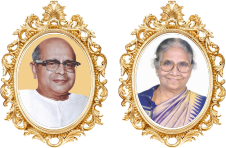Programmes Offered
B.E Electronics and Communication Engineering
M.E Embedded System and VLSI
Ph.D Electronics and Communication Engineering
Eligibility
B.E Electronics and Communication Engineering : As per AICTE norms
M.E Embedded System and VLSI : As per AICTE norms
Ph.D Electronics and Communication Engineering : Bachelor’s and Master’s Degrees such as B.E./B.Tech. and M.E/M.Tech. or equivalent degrees in the relevant field.
Programme Educational Objectives (PEOs) for B.E.
Bachelor of Engineering (B.E.) programme is based on Choice Based Credit System (CBCS) and Outcome Based Education (OBE) pattern.
Graduates of Electronics and Communication will be able to:
PEO1: Solve complex engineering and societal problems through the knowledge of Science, Electronics and Communication and mathematics fundamentals.
PEO2: Practice lifelong learning in the rapid changes in the technology and pursue higher education to solve real world problems as individuals and in a team.
PEO3: Get gainful employment in core companies or show leadership qualities to start venture and serve the nation.
Programme Specific Outcomes for B.E.
A graduate of Electronics and Communication Engineering Program will have ability to:
PSO1: Design and implement electronic systems for real time applications through expertise gained in communication systems, signal processing, VLSI and Embedded systems.
PSO2: Analyse and solve complex Electronics and Communication Engineering problems, using modern hardware and software tools either independently or in a team.
Programme Educational Objectives (PEOs) for M.E.
Graduates of M.E Embedded System and VLSI will be able to:
PEO1: The Postgraduates will specialise in analysis and design of systems that require Electronics controls, circuits, processing and communication as per the prescribed standards.
PEO2: The Post graduates will be trained in the fields of signal processing, embedded systems, networking and programming skills
Programme Specific Outcomes for M.E.
A graduate of Embedded System and VLSI programme will have the ability to:
PSO1: Design VLSI circuits to optimize power and area requirement, free from faults and dependencies by modeling simulation and testing.
PSO2: Apply advanced concepts of VLSI in providing optimized solutions to industrial and socio-commercial problems.






